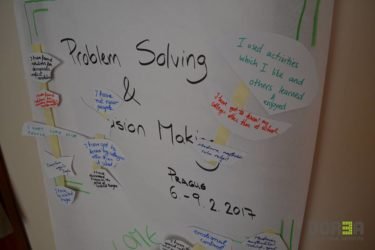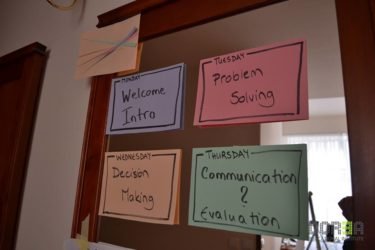Problem Solving and Decision Making: Grow as an Educator
 Problems come and go, however solving problems can turn into a creative quest and become a resourceful and insightful activity. Problem-solving and decision-making (PSDM) is a part of every person’s life experience and therefore, it is essential to develop the art of managing obstacles and reach organic solutions.
Problems come and go, however solving problems can turn into a creative quest and become a resourceful and insightful activity. Problem-solving and decision-making (PSDM) is a part of every person’s life experience and therefore, it is essential to develop the art of managing obstacles and reach organic solutions.
Here’s a short scheme that will break down the PSDM process:
- Definition of the obstacle/ tension. PSDM phenomenon requires logical and analytical thinking and therefore, it is important to approach the problem logically when it arises. Ask yourself questions: Why did it happen? What are the responses of people who are involved in the situation? What are possible solutions? And this question brings us to the next step.
- Generating alternatives. This is where the creativity comes in. Lateral thinking is another term for creativity. Thinking “outside the box” about something that might appear enigmatic at first will help you get a nuanced worldview and bring into being alternative ways of solving the problem. The diversity of options and enthusiasm are key! Step-by-step logic might have limits, but lateral thinking will uncover unexpected potentialities of the situation.
- Synthesizing. The process of synthesising will help you filter out unnecessary elements from the previous step. It is the pre-last step towards making a decision to act. If Step B is similar in nature to a brainstorming session, Step C is where you take a pen and cross out all the unnecessary options to get closer to the essence of the obstacle and the desired outcome.
- Experimenting with solutions. Final and the most obvious step is to make a decision and see how it works out. Experimenting with solutions is a creative process and a great exercise for intuiting and innovative thinking.
 Things to keep in mind:
Things to keep in mind:
- Study personality specifics and find out more about different personalities: Keirsey Temperament Sorter, Don Loury’s True Colours (personality) Test, Rorschach inkblot test, and many others.
- Develop emotional intelligence. Emotional intelligence, according to Psychology Today, emotional intelligence is associated with “emotional awareness,” the “ability to harness emotions” and “apply them to thinking and problem solving,” emotional management and regulation and discovering methods to cheer up and calm others down. Research done by Arefnasab, Zare, and Babamahmoodi (2012) that completed a comparative study to examine the correlation between emotional intelligence and problem-solving strategies showed that people with higher emotional intelligence tend to be more successful at solving obstacles and generating decisions.
- Develop communicative skills to avoid problem-creating situations in the future.
- Stimulate creativity on regular basis and trust in its power.
- Discover tips on how to manage stress when tension comes up in the working environment and you have to make a difficult decision.
- Keep track of your insights that you gained in the process and learn from them.
- Attend trainings on PSDM to share your experience with this phenomenon and learn from others. If you’re looking for possible trainings, Dorea Educational Institute organises PSDM trainings in different locations and you can find out more about them here.
Resources:
Arefnasab Z. et al, (2012) Emotional Intelligence and Problem Solving Strategy: Comparative Study Based on “Tower of Hanoi” Test. Iran J Psychiatry Behav Sci. 6 (2), 62–68. Retrieved from https://www.ncbi.nlm.nih.gov/pmc/articles/PMC3940005/
N.a. (n.d.). What Is Problem Solving? Retrieved 2017, from https://www.mindtools.com/pages/article/newTMC_00.htm
N.a. (n.d.). What Is Emotional Intelligence? Retrieved 2017, from https://www.psychologytoday.com/basics/emotional-intelligence
Prepared by Veronika Zhigailova

